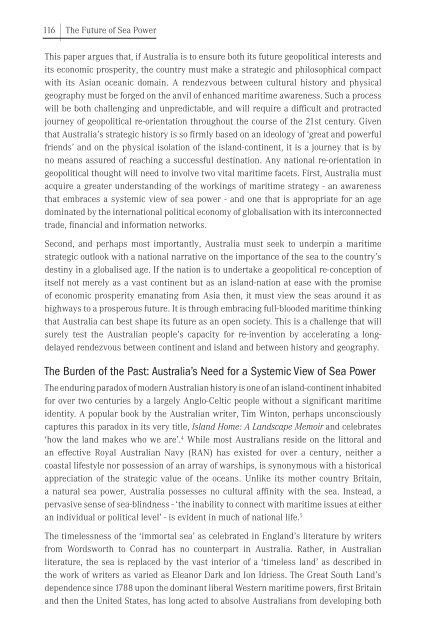THE FUTURE OF SEA POWER
SPC2015_Proceedings
SPC2015_Proceedings
You also want an ePaper? Increase the reach of your titles
YUMPU automatically turns print PDFs into web optimized ePapers that Google loves.
116 |<br />
The Future of Sea Power<br />
This paper argues that, if Australia is to ensure both its future geopolitical interests and<br />
its economic prosperity, the country must make a strategic and philosophical compact<br />
with its Asian oceanic domain. A rendezvous between cultural history and physical<br />
geography must be forged on the anvil of enhanced maritime awareness. Such a process<br />
will be both challenging and unpredictable, and will require a difficult and protracted<br />
journey of geopolitical re-orientation throughout the course of the 21st century. Given<br />
that Australia’s strategic history is so firmly based on an ideology of ‘great and powerful<br />
friends’ and on the physical isolation of the island-continent, it is a journey that is by<br />
no means assured of reaching a successful destination. Any national re-orientation in<br />
geopolitical thought will need to involve two vital maritime facets. First, Australia must<br />
acquire a greater understanding of the workings of maritime strategy - an awareness<br />
that embraces a systemic view of sea power - and one that is appropriate for an age<br />
dominated by the international political economy of globalisation with its interconnected<br />
trade, financial and information networks.<br />
Second, and perhaps most importantly, Australia must seek to underpin a maritime<br />
strategic outlook with a national narrative on the importance of the sea to the country’s<br />
destiny in a globalised age. If the nation is to undertake a geopolitical re-conception of<br />
itself not merely as a vast continent but as an island-nation at ease with the promise<br />
of economic prosperity emanating from Asia then, it must view the seas around it as<br />
highways to a prosperous future. It is through embracing full-blooded maritime thinking<br />
that Australia can best shape its future as an open society. This is a challenge that will<br />
surely test the Australian people’s capacity for re-invention by accelerating a longdelayed<br />
rendezvous between continent and island and between history and geography.<br />
The Burden of the Past: Australia’s Need for a Systemic View of Sea Power<br />
The enduring paradox of modern Australian history is one of an island-continent inhabited<br />
for over two centuries by a largely Anglo-Celtic people without a significant maritime<br />
identity. A popular book by the Australian writer, Tim Winton, perhaps unconsciously<br />
captures this paradox in its very title, Island Home: A Landscape Memoir and celebrates<br />
‘how the land makes who we are’. 4 While most Australians reside on the littoral and<br />
an effective Royal Australian Navy (RAN) has existed for over a century, neither a<br />
coastal lifestyle nor possession of an array of warships, is synonymous with a historical<br />
appreciation of the strategic value of the oceans. Unlike its mother country Britain,<br />
a natural sea power, Australia possesses no cultural affinity with the sea. Instead, a<br />
pervasive sense of sea-blindness - ‘the inability to connect with maritime issues at either<br />
an individual or political level’ - is evident in much of national life. 5<br />
The timelessness of the ‘immortal sea’ as celebrated in England’s literature by writers<br />
from Wordsworth to Conrad has no counterpart in Australia. Rather, in Australian<br />
literature, the sea is replaced by the vast interior of a ‘timeless land’ as described in<br />
the work of writers as varied as Eleanor Dark and Ion Idriess. The Great South Land’s<br />
dependence since 1788 upon the dominant liberal Western maritime powers, first Britain<br />
and then the United States, has long acted to absolve Australians from developing both


